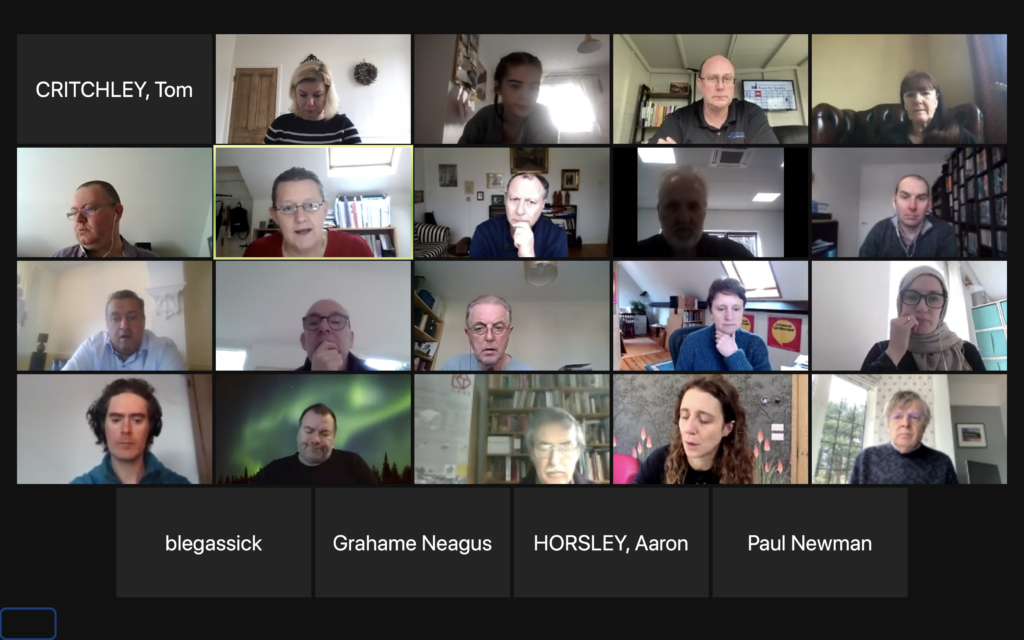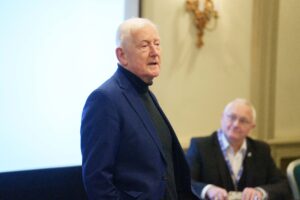Representative from the National Grid discussed the push to decarbonise the transport sector with renewable energy and preparing for the supply and demand implications of a growing EV market.
On 23 February, Dr. Louise Brooke-Smith chaired the first Planning working party meeting of the year, with guest speaker Dr. Russell Fowler from the National Grid, who leads on future energy scenarios to ensure supply meets demand of electricity as our needs change in the near future.
Dr. Russell Fowler spoke on the ‘Challenges of Transforming our Energy Systems’. He explained that the UK’s commitment to achieve net-zero emissions by 2050 means that whereas electricity originally comes from coal, oil, and gas power plants, today there is a focus on switching to renewable energy, which came into use approximately 15 years ago.
Dr. Fowler highlighted that transport is currently the dirtiest sector of the economy, and the biggest challenge to decarbonise. The National Grid is the enabler of future clean transport by ensuring clean power is generated to where the transport sector needs it.
Plug-in electric cars saw a significant growth in the market, having a 11 per cent share in 2020 up from 3 per cent in 2019. With the sale of petrol and diesel cars to be banned from 2030 onwards, there has to be a rapid uptake on an extensive network of rapid charging point across the country to eliminate range anxiety prospect EV buyers face, as 79 per cent of car owners have yet to covert to electric.
Dr. Fowler went on to suggest that the next challenge the National Grid has is to support electricity infrastructure to enable the decarbonisation of transport. The Committee on Climate Change recommend public charging to increase from the 35,000 charge points in place today, to 300,000 by 2030. This will be alongside an increase of 1,500 rapid charge points to 6,000 in the same timeframe.
‘In order to improve our air quality, we need to see the roll-out of electric vehicles at pace, which in turn needs a network of ultra-rapid charges delivered ahead of them. To enable this, the electricity network infrastructure is critical and thinking about these requirements is needed upfront to deliver timely and cost-effective infrastructure,’ Dr. Fowler said.
Dr. Louise Brooke-Smith asked Dr. Fowler how the National Grid plans to supply these networks around the country, and whether there is enough energy in the system. He responded that the Grid has forecasted electric vehicles over a decade, and it is important to ensure that the local network can cope with demand. Therefore, it is crucial to know the distribution of EVs across the country, which is hindered by the DfT withholding EV grant data.
However, in terms of power, it is expected that the uptake of renewable energy will ensure there is enough power to ensure the network is ready. Dr. Fowler referenced having an integrated approach by sharing power with other European countries to ensure we have the right amount of energy at the right time.
Nathan Wilson, from Allison Transmission, questioned when HGVs will likely need to be electric, as commercial vehicles were not included in the 2030 petrol and diesel cut-off date. Dr. Fowler elaborated that 2050 would seem to be the ultimate backstop, although there will be a consultation in spring for heavier vehicles, with dates from the Committee on Climate Change suggesting 2040 would be better placed.
The meeting was attended by representatives from Renault Trucks, Southwark Council, AirSafe London, Element-4, Climate 22, the London School of Economics, Allison Transmission, EnviroTech, Wijs-Air, Ricardo, AECOM, CLS Energy, CAVT, and the Tate Galleries.
If you are interested in joining the Westminster Commission for Road Air Quality clean UK road transport, contact us today at Jason.pidgeon@visiecommunications.co.uk.




